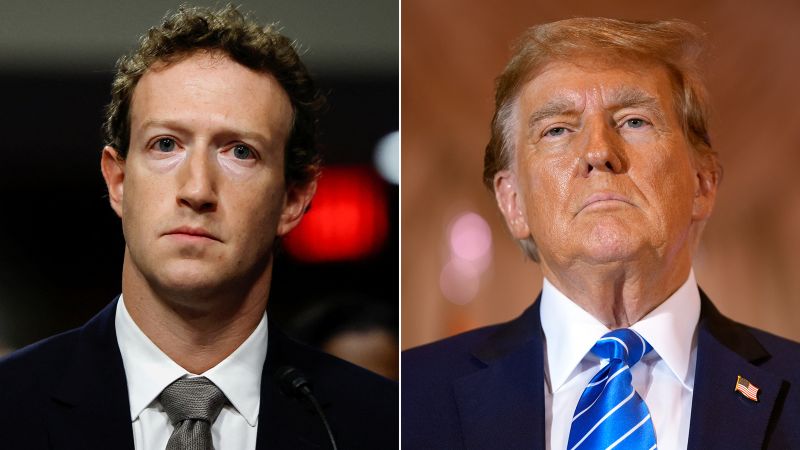Zuckerberg's Meta In The Age Of Trump: Challenges And Opportunities

Table of Contents
The Challenge of Misinformation and Political Polarization
The Trump presidency, and its aftermath, presented a significant challenge to Zuckerberg's Meta in the form of widespread misinformation and escalating political polarization. The impact on user trust and the very fabric of social media discourse is undeniable.
The Spread of Disinformation during the Trump Era
Meta's platforms, including Facebook and Instagram, became fertile ground for the dissemination of disinformation during the Trump era. This included:
- QAnon: The conspiracy theory thrived on Meta's platforms, reaching millions of users and contributing to real-world violence.
- Election Interference Campaigns: Foreign actors leveraged Meta's advertising system to spread propaganda and sow discord during crucial elections.
- COVID-19 Misinformation: The pandemic saw a surge in false and misleading information about the virus, treatments, and vaccines, amplified across Meta's social media networks.
The consequence? Erosion of user trust in the platform, damage to Meta's reputation, and significant negative media coverage. Studies have shown that a substantial percentage of users encountered misinformation on Meta platforms regularly. This resulted in calls for increased accountability and stricter content moderation policies.
The Impact of Political Polarization on User Engagement
Political polarization significantly altered user engagement on Meta's platforms. Echo chambers formed, reinforcing existing beliefs and limiting exposure to diverse perspectives.
- Algorithmic Amplification: Meta's algorithms, designed to maximize engagement, unintentionally amplified divisive content, further fueling polarization.
- Content Moderation Challenges: Moderating content in a highly polarized environment is incredibly complex, requiring nuanced judgment calls that often leave Meta vulnerable to criticism from both sides of the political spectrum.
- Impact on Revenue and Retention: The polarized environment impacted advertising revenue as brands grew hesitant to associate with platforms perceived as breeding grounds for extremism. User retention also suffered as disillusioned users sought alternative platforms.
Meta has attempted to address polarization through algorithmic changes, investing heavily in fact-checking partnerships, and promoting initiatives focused on civic engagement. However, the challenge of maintaining a balanced and trustworthy platform in a highly polarized world remains considerable.
Regulatory Scrutiny and Legal Battles
Zuckerberg's Meta faces intense regulatory scrutiny and numerous legal battles, a significant challenge stemming partly from concerns raised during and after the Trump administration.
Antitrust Concerns and Government Investigations
Meta has faced numerous antitrust lawsuits and government investigations concerning its market dominance and anti-competitive practices.
- Acquisitions: The acquisition of Instagram and WhatsApp raised concerns about stifling competition.
- Data Practices: Investigations focused on Meta's data collection and use practices, raising questions about user privacy and consent.
- Market Power: Concerns persist that Meta uses its dominant position to unfairly disadvantage smaller competitors.
These legal challenges threaten Meta's operations, its future growth, and could fundamentally reshape its business model through increased regulatory oversight and potential forced divestitures.
Data Privacy and Security Concerns
Data privacy and security are ongoing concerns surrounding Meta's platforms.
- Cambridge Analytica Scandal: This scandal highlighted vulnerabilities in Meta's data security protocols and raised significant privacy concerns.
- GDPR and CCPA: Compliance with data privacy regulations like GDPR (General Data Protection Regulation) and CCPA (California Consumer Privacy Act) demands significant resources and imposes operational constraints.
- Balancing Privacy and Advertising: The challenge of balancing user privacy with the need for personalized advertising, the core of Meta's business model, remains a crucial area of concern.
Meta has invested heavily in improving its data security and user privacy measures, but the challenges are significant and ongoing.
Opportunities for Growth and Adaptation
Despite the challenges, Zuckerberg's Meta has opportunities for growth and adaptation in the evolving political landscape.
Leveraging the Metaverse for Political Discourse
The metaverse offers potential for more constructive political dialogue.
- Virtual Town Halls: The metaverse could create virtual spaces for politicians and citizens to engage in more direct and inclusive dialogue.
- Debates and Discussions: Virtual environments could be designed to facilitate respectful and moderated debates on complex political issues.
However, creating a safe and inclusive virtual space for political discussion requires careful planning and robust moderation mechanisms to prevent the same problems that plague traditional social media platforms.
Improving Content Moderation and Fact-Checking
Meta continues to invest in improving its content moderation and fact-checking mechanisms.
- AI and Machine Learning: Advanced technologies like AI and machine learning can play a crucial role in identifying and removing harmful content at scale.
- Human Oversight: Human oversight remains critical, especially for complex cases requiring nuanced judgment and context.
- Transparency and Accountability: Increased transparency in Meta's content moderation policies and processes is essential to rebuild trust.
Significant improvements are necessary to effectively address the challenge of misinformation and polarization.
Expanding into Emerging Markets
Emerging markets present significant growth opportunities for Meta.
- Diverse Political Landscapes: These markets offer varied political contexts and opportunities to adapt the platform to suit specific needs.
- Untapped User Base: Many emerging markets have large populations with limited access to the internet, representing a massive potential user base.
However, expanding into emerging markets comes with its own set of challenges, including navigating diverse regulatory environments and cultural nuances.
Conclusion: The Future of Zuckerberg's Meta in a Shifting Political Landscape
Zuckerberg's Meta's future is inextricably linked to its ability to navigate the complex and ever-shifting political landscape. The challenges are considerable, encompassing misinformation, political polarization, regulatory scrutiny, and data privacy concerns. However, opportunities exist for growth and adaptation, particularly in leveraging the metaverse for constructive dialogue, enhancing content moderation, and expanding into emerging markets. Addressing these challenges effectively will be critical to restoring user trust and ensuring the long-term success of Zuckerberg's Meta. Share this article and join the conversation – what's your perspective on the future of Zuckerberg's Meta and its role in the evolving political landscape? Further reading on misinformation, social media regulation, and the metaverse can offer deeper insights into this crucial topic.

Featured Posts
-
 Anons Matchiv Ligi Chempioniv Arsenal Ps Zh Ta Barselona Inter 2024 2025
May 08, 2025
Anons Matchiv Ligi Chempioniv Arsenal Ps Zh Ta Barselona Inter 2024 2025
May 08, 2025 -
 Wall Street In Kripto Para Yatirimlarindaki Doenuesuemue
May 08, 2025
Wall Street In Kripto Para Yatirimlarindaki Doenuesuemue
May 08, 2025 -
 Barcelona Vs Inter Milan Nerazzurris Road To The Champions League Final
May 08, 2025
Barcelona Vs Inter Milan Nerazzurris Road To The Champions League Final
May 08, 2025 -
 El Gol Que Corono A Flamengo Arrascaeta Brilla En La Taca Guanabara
May 08, 2025
El Gol Que Corono A Flamengo Arrascaeta Brilla En La Taca Guanabara
May 08, 2025 -
 Dwp Benefit Cuts Final Payments And Next Steps
May 08, 2025
Dwp Benefit Cuts Final Payments And Next Steps
May 08, 2025
